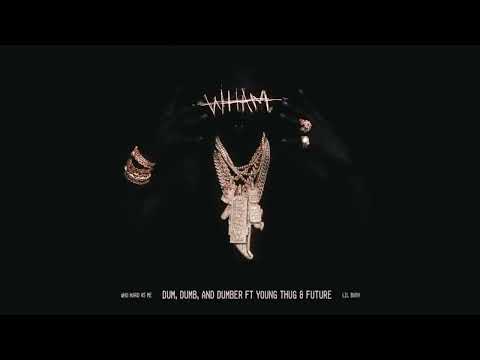
Lil Baby “WHAM” Review

Lil Baby has been stuck in an awkward gray zone since 2022, when It’s Only Me arrived to a wave of disappointing reviews, sparking speculation that his reign might be coming to an end. In the years that followed, he remained relatively inactive on the musical front, aside from a few singles and features that failed to make the impact his earlier catalog once did. For artists like Baby, who flooded the market during their peak, stepping out of the limelight often aims to build anticipation for a grand return. However, the trajectory of Baby’s evolution has never been entirely clear. Would he fade into the executive role as many trappers-turned-rappers do, or would he discover a second wind to reclaim his spot with ease?
WHAM attempts to affirm the latter, but its overall effect is lackluster. The opening track, “Listen Up,” feels like a tired effort to recap his career and adjustments to fame, though there are flashes of genuine heartache. For example, he reflects on standing in solidarity with those in the hip-hop community unjustly targeted by law enforcement and briefly touches on feelings of self-reproach for leaving people behind. Over lush and opulent orchestral production, Lil Baby revisits familiar themes with little enthusiasm. A line like “Ain’t no rules inside the streets no more, anything goes / But I’m a diamond in the dirt, so I won’t ever change roles” hints at resilience but feels diluted when paired with a delivery lacking energy. It’s hard to blame him entirely without considering external pressures: his proximity to billionaires like Michael Rubin, the incarceration of Young Thug and YSL, his strained relationship with Gunna, and the dissolution of the 4PF brand amid a crackdown on criminal organizations in Atlanta. These factors weigh heavily, but they don’t excuse the stagnation in his artistry.
A significant portion of the album finds Baby wrestling with his reluctance to change—a recurring theme in his recent work. However, this approach works best when paired with the right production. Wheezy employs his Midas touch to deliver some of the album’s high points including “Stiff Gang.” Co-produced by Southside, Baby channels his earlier hunger with an unrelenting flow reminiscent of “Drip Too Hard.” Similarly, “Dum Dumb & Dumber” stands out as an electrifying moment. However, this is largely thanks to Future and Young Thug’s performances. Thugger’s restrained eccentricities pack a guttural punch that marks a triumphant return post-RICO trial, while Future’s first feature of the year suggests that 2025 could usher in Super Slimey 2. By contrast, Lil Baby takes a backseat, coasting through his verse without leaving much of an impression.
For the most part, WHAM’s best moments are upheld by its collaborators. GloRilla’s quotable bars on “Redbone” add an infectious energy contrasting with Baby’s subdued delivery. The reunion between Rylo Rodriguez, Rod Wave, and Baby on “By Myself” brings a raw emotional intensity that feels genuine, unlike the forced sentimentality of tracks like “So Sorry” and “I Promise.” Travis Scott’s feature on “Stuff” is another highlight, largely because Baby leans into Travis’s signature style. The sticky flows, hallucinatory melodies, and apocalyptic production showcase Scott’s innate hitmaking prowess, and bolstered by Baby’s laid-back contribution.
Much of WHAM revolves around Baby’s assertion that he hasn’t changed but the results are shaky. Tracks like “Say Twin” attempt to recreate the magic of “Woah” or “Heyy” but fall flat, while “F U 2x” feels like little more than a throwaway anthem for TikTok trends. Ultimately, WHAM struggles to pinpoint the nuances that once fueled Baby’s organic hitmaking prowess. It lacks the hunger that made him a star and doesn’t offer enough evolution to keep listeners engaged. While Baby may have no intention of altering the formula that turned him into a millionaire, on WHAM, he sounds more stagnant than stubborn But for now, WHAM serves as a reminder of his potential rather than a realization of it.
About The Author
Aron A. is a features editor for HotNewHipHop. Beginning his tenure at HotNewHipHop in July 2017, he has comprehensively documented the biggest stories in the culture over the past few years.
Throughout his time, Aron’s helped introduce a number of buzzing up-and-coming artists to our audience, identifying regional trends and highlighting hip-hop from across the globe. As a Canadian-based music journalist, he has also made a concerted effort to put spotlights on artists hailing from North of the border as part of Rise & Grind, the weekly interview series that he created and launched in 2021.
Aron also broke a number of stories through his extensive interviews with beloved figures in the culture. These include industry vets (Quality Control co-founder Kevin “Coach K” Lee, Wayno Clark), definitive producers (DJ Paul, Hit-Boy, Zaytoven), cultural disruptors (Soulja Boy), lyrical heavyweights (Pusha T, Styles P, Danny Brown), cultural pioneers (Dapper Dan, Big Daddy Kane), and the next generation of stars (Lil Durk, Latto, Fivio Foreign, Denzel Curry). Aron also penned cover stories with the likes of Rick Ross, Central Cee, Moneybagg Yo, Vince Staples, and Bobby Shmurda.
…

